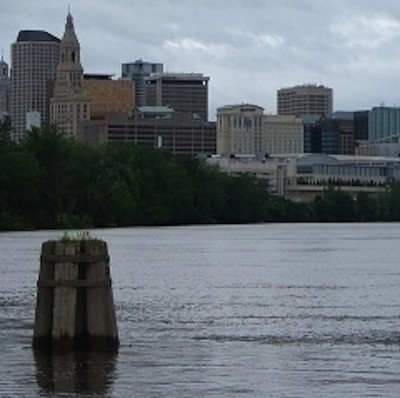Barry Hinckley: Where Will You Be When Rhode Island Goes Broke?
Saturday, March 22, 2014
We tend to remember where we were when huge events happened. I remember where I was and who I was with when we heard the tragic news of Princess Di. My parents always recall where they were when they heard Walter Cronkite announce the awful news about JFK’s assassination. Shocking, unexpected incidents always mark the memory. Sadly, about two-thirds of our residents won’t expect Rhode Island’s austerity (and the domino effect on our cities and towns) having invested in and believing the platitudes of progressive politicians who promote yet another hollow plan to solve our problems by promoting “innovation” or “investments in infrastructure” and other top down socialist policies which have all failed as is evident by our relative position in the league of 50 states: Last.
For those of you keeping score at home, “innovation” in progressive speak is figuring out new ways to take money from productive people and transfer it to unproductive people. And “investments in infrastructure” is government’s primary job, and should be on-going. Why is one of the most heavily taxed states in the nation, has this primary function of government been ignored for years? This can only be explained by following the money and realizing it simply isn’t a priority. Potholes don’t vote, people that get free stuff do…and those costs will be our undoing.
First, the numbers
The progressives who run the state and make up our congressional delegation and their followers will attack me and call me names like George W. Bush, but the numbers speak for themselves, though that won’t stop them from doubling down on the policies that got us here and still calling me names.
GET THE LATEST BREAKING NEWS HERE -- SIGN UP FOR GOLOCAL FREE DAILY EBLASTThe proposed State Budget for 2015 is $8.54 Billion. Smith Hill raises about 3.4 billion dollars a year in real revenue from businesses and people who work and shop. Smith Hill also spends about 3.4 billion on social welfare services for the poorest people in Rhode Island, an unfortunate and growing number in the most jobless state in America. The balance of our budget, subtracting university tuitions, fees and “restricted funds” etc., is made up of federal dollars. And as they say in London, “Mind the Gap.” A multi-billon dollar gap. And therein lays the problem, that big ATM in DC is running out of credit and when they do, austerity sets in, over night. Here’s how I think it will go down:
Rhode Island gets back about 80% of the Federal tax dollars we send to Washington, DC making our congressional delegation, not surprisingly, among the worst performers in bringing home the bacon, as many states get back 100% or more. That said, we obviously rely heavily on those Federal dollars to meet the commitments that make up the balance of our budget. And those Federal revenues are going to slowly dry up.
The world’s reserve currency
When the US negotiated the right to be the “World Reserve Currency” after World War Two at the Brenton Woods Conference, we essentially were granted a global franchise on money. All trade by international law had to be conducted in USD. This meant all other countries had to float their currency against the US Dollar to buy the things they didn’t produce locally, for example oil and food. This had the result of creating a very strong dollar and making it by default, the only “global currency”. Everyone needed dollars to buy what they wanted. This heavily propped up the value of the dollar for decades and allowed us to print and borrow more and more each year.
The real “Ugly American,” the trait other nations hate, is the fact that they must have some sort of fiscal responsibility to float their currency against the US Dollar to trade for the goods and services they want and need. In contrast, we in America essentially get to print more dollars to buy what we need. This privilege, of being the World Reserve Currency, has been seriously abused for decades as our debts mount and the “Balance Sheet” at the Federal Reserve expands.
The rest of the world, who are effectively loaning us this money by honoring our status, is eventually going to take this “right” away from us as is evidenced by China blatantly circumventing the dollar against international convention and doing over 20 direct currency deals. When we lose our World Reserve Currency Status and our ability to artificially hold down rates with this shell game between the Treasury and the Fed, interest rates will rise. If we are lucky, rates will move to a level many of us are familiar with of say 8%, if we’re unlucky, rates will spike. This is completely plausible based on history and actual market forces. Let’s face it, rates won’t be 4% or less forever based on our fiscal irresponsibility, in fact it’s amazing it hasn’t happened already.
So here’s the problem
For every 1% point increase in interest rates it costs the US Government about $100 billion extra a year to service our massive debt. In 2012 we spent about $430 billion in taxpayer money just on interest on our debt at these historically low rates. Today, the USA’s discretionary budget (the money to run everything in the government outside of Entitlements and Defense) is about $600 billion. We can continue to cut the defense budget, and we will, but keep in mind much of that is needed veterans affairs and civil defense. So it’s easy to see that when interest rates normalize to rates many of us are familiar with, meaning a 4.5 % increase, our borrowing costs will increase over time by another $450 billion. As we finance expiring and new debt, we will slowly wipe out the discretionary budget needed to run the Federal Government.
Unfortunately, for Rhode Island, the $2.7 billion we get back from the Feds every year begins to evaporate as the US Government needs more and more money to service the almost 20 trillion we have racked up in debt, on top of the funds needed to run the government. So the 80% recovery rate of funds we send to Washington today could easily go down to 50% or less! When the state begins to get fewer and fewer federal funds, as I said, it all rolls down hill. Cities and towns get fewer and fewer funds from the state. And with 20 of our 39 cities and towns carrying balance sheets of unfunded pension liabilities, which could today qualify them for insolvency; it’s not going to be pretty. Furthermore, remember that huge revenue gap between Real Revenue and Federal Revenue Support? Some very tough decisions are going to have to be made on Smith Hill leading to addiction type withdrawals and austerity as federal support slowly wanes.
The only questions that remain are what will trigger the interest rate spike and when will it will happen? Will it be China hardening their currency through their financial center in Hong Kong? They’ve been roving the world buying up minerals and other natural resources that could stand behind a new currency. Or could it be a major state like Illinois going broke and needing a Federal bailout? Russia causing another war we can’t afford? Or potentially some unforeseen event.
If you think we can keep up this game forever, just remember, that one trillion seconds, to put our debt in perspective, is almost 32,000 years and we’re going to cross twenty trillion in debt soon. The pain train is coming…Where will you be when it arrives?
Former U.S. Senate candidate Barry Hinckley is an entrepreneur, most recently founding and building Bullhorn, Inc. into a leader in staffing and recruiting software. Bullhorn was sold in 2012 to Vista Equity Partners. Hinckley, a free market libertarian, lives in Newport where he is working on his next business venture.
Related Slideshow: New England States With the Most State Debt
Related Articles
- NEW: Hinckley Calls On Senator Whitehouse to Release Tax Returns
- Rhode Island Has 5th Highest Student Loan Debt in Country
- NEW: Hinckley Raises $325k in 3rd Quarter
- Rhode Island State Debt Among Highest in US
- NEW: Hinckley Rips Whitehouse for Leaving DISCLOSE Act Debate
- Gary Sasse: Is RI’s Tax Climate Really The 5th Worst?
- NEW: Hinckley Warns Thousands of Layoffs Within Defense Industry in RI
- Rhode Island Ranked 10th Worst State For Gun Owners
- 4 Things RI’s Government Can Do to Improve the Economy, But Won’t
- Gary Sasse: Deep in Debt in the Ocean State
- Rhode Island’s Best and Worst Cities and Towns for Walkers
- Hinckley Calls Whitehouse Jobs Plan ‘Woefully Insufficient’
- INVESTIGATION: RI Has Defaulted on Moral Obligation Debt Before
- The Best and Worst Run States in New England
- Hinckley vs Whitehouse: A Spiritual War
- INVESTIGATION: State Debt Hits $8.2 Billion
- NEW: Hinckley Blasts Whitehouse Over PAC Money
- John Perilli: Down With the Debt Ceiling















